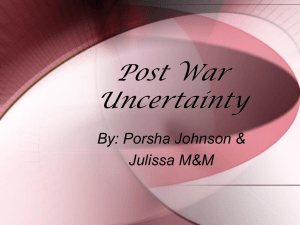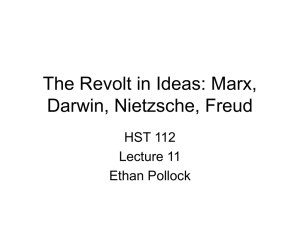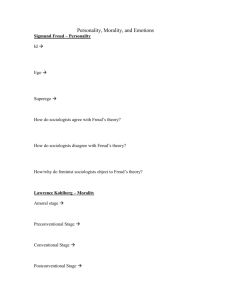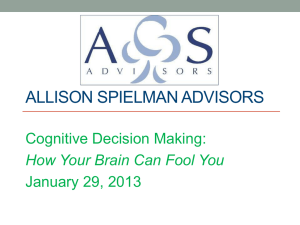Psychology & Religion 2014
advertisement
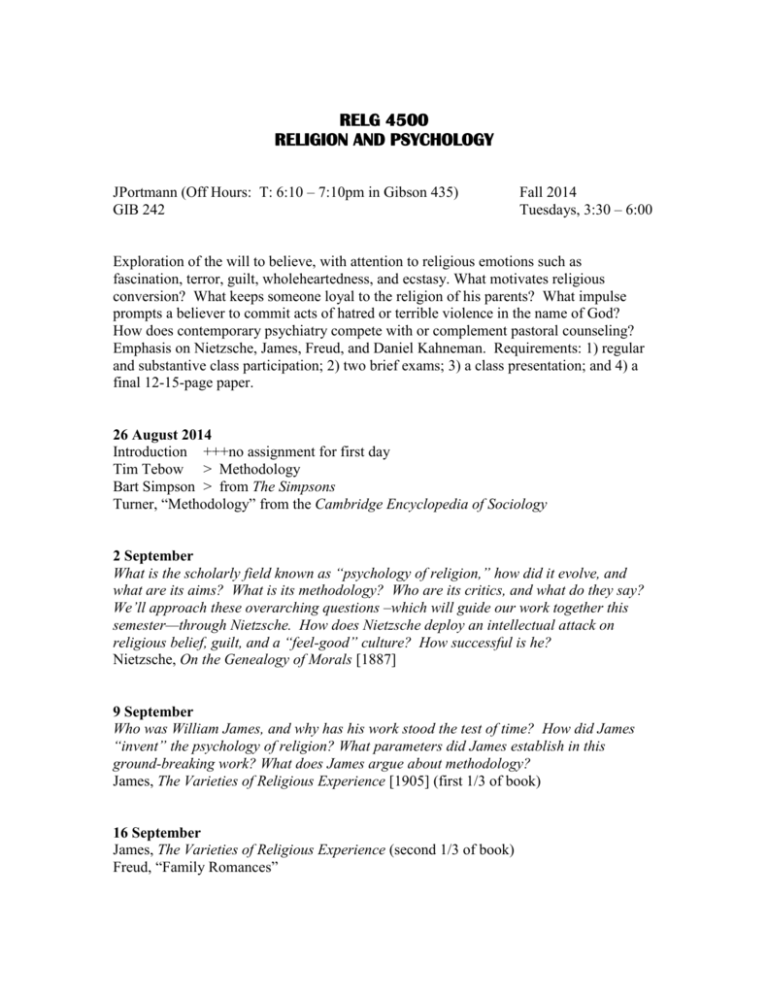
RELG 4500
RELIGION AND PSYCHOLOGY
JPortmann (Off Hours: T: 6:10 – 7:10pm in Gibson 435)
GIB 242
Fall 2014
Tuesdays, 3:30 – 6:00
Exploration of the will to believe, with attention to religious emotions such as
fascination, terror, guilt, wholeheartedness, and ecstasy. What motivates religious
conversion? What keeps someone loyal to the religion of his parents? What impulse
prompts a believer to commit acts of hatred or terrible violence in the name of God?
How does contemporary psychiatry compete with or complement pastoral counseling?
Emphasis on Nietzsche, James, Freud, and Daniel Kahneman. Requirements: 1) regular
and substantive class participation; 2) two brief exams; 3) a class presentation; and 4) a
final 12-15-page paper.
26 August 2014
Introduction +++no assignment for first day
Tim Tebow > Methodology
Bart Simpson > from The Simpsons
Turner, “Methodology” from the Cambridge Encyclopedia of Sociology
2 September
What is the scholarly field known as “psychology of religion,” how did it evolve, and
what are its aims? What is its methodology? Who are its critics, and what do they say?
We’ll approach these overarching questions –which will guide our work together this
semester—through Nietzsche. How does Nietzsche deploy an intellectual attack on
religious belief, guilt, and a “feel-good” culture? How successful is he?
Nietzsche, On the Genealogy of Morals [1887]
9 September
Who was William James, and why has his work stood the test of time? How did James
“invent” the psychology of religion? What parameters did James establish in this
ground-breaking work? What does James argue about methodology?
James, The Varieties of Religious Experience [1905] (first 1/3 of book)
16 September
James, The Varieties of Religious Experience (second 1/3 of book)
Freud, “Family Romances”
17 September 2014 – MAKE-UP CLASS // Clemons 321, 5:00-7:30pm
James, The Varieties of Religious Experience (third 1/3 of book)
articles on Collab:
Gallagher, “Conversion and Community in Late Antiquity”
Epley et al., “Believers’ Estimates of God’s Beliefs are More Egocentric”
If you cannot make this session, simply submit to me a 4-6-page critical response to the
readings by 12:00pm, 24 September
23 September -- [*first reading exam*]
What does Freud mean by his title? What does he argue in this later work and how
successful do you find him in this attempt? What do you make of his uncompromising
secularism, his mocking of religious belief? Why (beyond the obvious) did American
Christians object strenuously to Freud and his work?
Freud, The Future of an Illusion [1927]
Gervais and Norenzayan, “Analytic Thinking Promotes Religious Disbelief”
30 September
How convincing do you find the story of the little boy who may have visited heaven?
Todd Burpo, Heaven is for Real
Thomas Nagel, “The Absurd”
Alain de Botton, from Religion for Atheists
7 October
Are religions like living organisms? Do they evolve over time and adapt to changing
environments? If so, does this debase a faith in any way? How do biologists argue that
religious belief arises out of fear? How does their conclusion sit with Nietzsche’s?
Nicholas Wade, The Faith Instinct [first half]
[11-14 October 2014: Fall Reading Days]
21 October
Nicholas Wade, The Faith Instinct [second half]
28 October
How does Kahneman distinguish between System 1 and System 2? What does his work
tell us about the emotions? How does his research challenge or confirm the insights of
William James?
Daniel Kahneman, Thinking, Fast and Slow (first eleven chapters)
4 November
What are the religious implications of Kahneman’s work? How do you think priming
affects religious believers? Do Kahneman’s findings undermine or challenge
pragmatism?
Kahneman, Thinking, Fast and Slow (chapters to be announced)
11 November
Bess believes that when she prays, God hears her; she also hears God respond. What do
you make of Bess’s faith? How is Malick’s entire film a prayer, a conversation with
God?
Lars von Trier, Breaking the Waves (152 minutes)
Terence Malick, The Tree of Life (we will watch the film together in class, 139 minutes)
Lester Hunt, “Motion Pictures as a Philosophical Resource”
Gray and Wegner, “Blaming God for Our Pain: Human Suffering and the Divine Mind”
12 November
MAKE-UP CLASS – Clemons 407, 5:30-8:00pm
No reading assignment today. You are to bring to class the first paragraph of your paper
or, if you prefer, the outline for your paper. We will critique paper drafts in groups. If
you cannot make this class, simply submit (by noon the following day) a polished outline
for your paper.
Paper Workshop
18 November -- [*second reading exam*]
You now know that James argued religious beliefs are emotional. What are the emotions
and why should we care about them? What do the emotions have to do with violence?
How does spiritual healing differ from psychiatric therapy?
Ginges et al., “Religion and Support for Suicide Attacks”
Batson, et al., “Mental Health or Sickness?”
Sharp, “How Does Prayer Help Manage Emotions?”
25 November )))) NO CLASS [made up on 12 November] ))))
2 December )))) NO CLASS [made up on 17 September] ))))
Classes end: Friday, 5 December 2014
*****
Final Exam: Tuesday, 9 December 2014 (9:00am – 12:00pm)
Paper due date = 8 December, 12:00pm sharp
If you would like to receive comments on your final paper (this does not mean on a draft,
but on your final paper), you must submit the paper to me by 5:00pm on 5 December
2014. It takes me a good deal of time to comment extensively on a paper, so you will
have to allow me extra time if you would like comments. If you choose to forgo
comments for extra time to work on your paper, you will not be penalized in any way.
Required Texts:
The following texts are available for purchase in the UVa bookstore:
Nietzsche, On the Genealogy of Morals
Freud, The Future of an Illusion
James, The Varieties of Religious Experience
Kahneman, Thinking, Fast and Slow
Nicholas Wade, The Faith Instinct
FINAL GRADES
Class participation
Two exams
Paper (12-15 pp.)
20%
30%
50%
[due 8 December, 12:00pm sharp]
Please note the significance of class participation (comprised of both quantity and
quality). Naturally, attendance is mandatory. Your grade will automatically fall on the
second (and each successive) absence.
You may take extra time to complete your final paper, but I will reduce your paper grade
by ½ a mark for each day your paper is late [starting at 12:01pm on 8 December].
In this advanced undergraduate seminar, you are expected to formulate a paper topic on
your own (I will be pleased to help you along, but I will not give you a topic). Many
ideas should present themselves in the course of the seminar – from criticism of James to
championing of him, to methodology, to film, and to lonelieness. In no way should your
final paper amount to a book report or a literature review: Your final paper should
evidence creativity and independent thought.
The reading exams will test how closely you have done the assigned readings. You may
not make up the exams without a written statement from a physician certifying the
seriousness of a medical condition (physical or mental). Students suffering from
depression or anxiety attacks should alert me well in advance of absences from seminar
and the final paper deadline. {See the Religious Studies Department’s pending policy on
helping students who suffer from clinical depression.}
